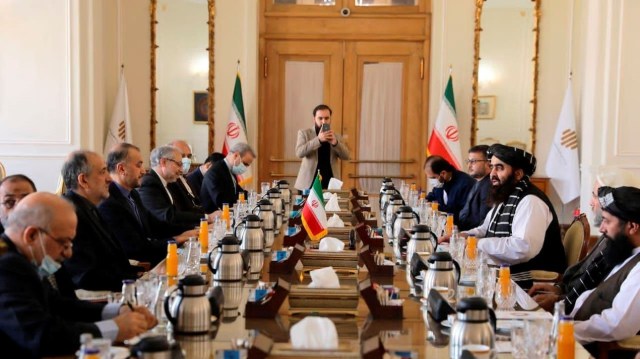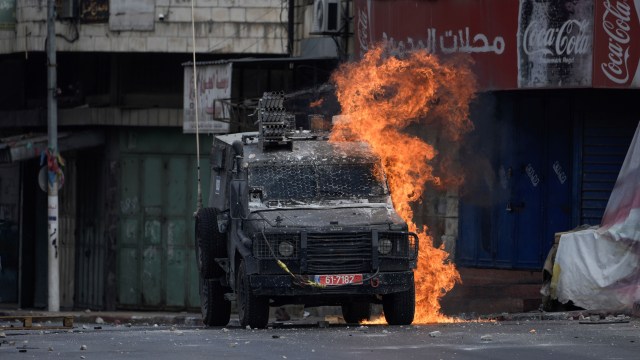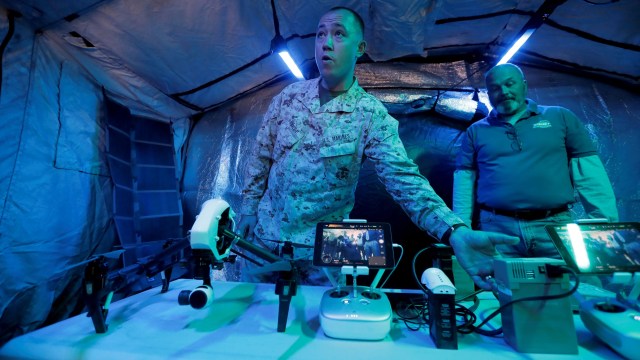Hello, everyone. Today at WPR, we’re covering how the U.S. military could help fight climate change and Iran’s relations with a Taliban-ruled Afghanistan.
Now, here’s our take on today’s top story:
Russia: The central bank in Russia raised its key interest rate by 3.5 percentage points on Tuesday, an emergency move designed to fight inflation and strengthen the ruble, which has lost more than a third of its value since the beginning of the year. (AP)
Our Take: Since Russia’s invasion of Ukraine, many observers have criticized the Western sanctions placed on Russia as ineffective. After all, sanctions imposed before the war in an attempt to deter Russia from invading failed to do so, and sanctions imposed after the invasion do not seem to have changed Moscow’s calculus so far.
Get the Daily Review sent straight to your inbox every weekday.
But most of these criticisms have been premature. As Agathe Demarais wrote in February, “Russia’s financial resources are far greater than those of other sanctioned economies. So sanctions will take time to bite, and their effect will be slow to emerge.”
In fact, the immediate post-invasion wave of sanctions was designed to be not coercive, but rather punitive, to make Moscow pay a cost for its aggression. Subsequent sanctions were meant to further punish Russia, while shielding the West from Russian coercion by delinking Europe’s economy from Russia’s, particularly with regard to its dependency on Russian energy exports. Both of these efforts represented long-term strategies to weaken Russia’s economy over time.
To the extent there was any coercive intent to the sanctions, it was in the potential value of sanctions relief as an incentive to get Russia to the negotiating table. But that, too, was a long-term strategy that could only become effective once the impact of sanctions had become clear.
The ruble’s fall and the central bank’s radical measures to prop it up are yet another sign that Western sanctions are indeed having a significant cumulative effect on Russia’s economy, as intended. That means the punitive goal of sanctions is working, whether or not they change Russia’s calculus with regard to the war in Ukraine.

Biden Should Use the Military to Help ‘Sell’ a Climate Emergency
Against the backdrop of a summer of worldwide climate disasters and deadly wildfires in Maui, U.S. President Joe Biden is facing renewed calls to declare a climate emergency. But he has been hedging on whether to do so for political reasons.
Having already declared climate change a national security priority, the Biden administration is now overlooking an untapped source of political capital that would ease the declaration of a climate emergency: the authority of the U.S. armed forces and its messenger effects with the Republican Party’s electoral base.
Columnist Charli Carpenter breaks down why the military is the best institution to explain to the U.S. public that climate change is a national security issue.
A Taliban-Led Afghanistan Isn’t the Neighbor Iran Bargained For
For the two decades following the attacks of 9/11, Iran blamed much of Afghanistan’s miseries on the military intervention there by the United States and its allies, which Tehran characterized as a war of imperial conquest.

But two years after the U.S. withdrawal that Tehran had long demanded, and with the Taliban now firmly in power in Kabul, Iran finds itself facing a unique set of challenges emanating from Afghanistan. Borzou Daragahi explains what those challenges are in today’s briefing.

Question of the Day: According to Freedom House, which of the following countries is the only free democracy in Southeast Asia?
Find the answer in the latest WPR Weekly Quiz, then read Joshua Kurlantzick’s briefing on the state of democracy in Southeast Asia.

Israeli forces shot and killed two Palestinians, including a 16-year-old, in a raid in the occupied West Bank on Tuesday, AP reports. Under a government led by far-right nationalists, Israel has been carrying out near-nightly raids in the West Bank for months, fueling tensions in the region.
As Hugh Lovatt wrote last month, Israel’s dangerous escalation of violence in the West Bank has strengthened popular resistance and energized Palestinian armed groups, making a new Palestinian intifada, or uprising, against Israel seem increasingly likely.

The West Bank Is a Powder Keg. Israel’s Raids Could Set It Off
July 14, 2023 | Instead of stopping violence in the West Bank, Israel’s military operations are energizing Palestinian armed groups. Read more.
*****
An airstrike on a town square in Ethiopia’s Amhara region on Sunday killed at least 26 people, an attack apparently targeting members of the Fano ethnic militia. Violence in Ethiopia’s second-largest state broke out earlier this month over a disputed plan to absorb regional security forces into the national army.
In tomorrow’s briefing, Bereket Diriba will look at the roots of the conflict in Amhara and its security and political implications for Ethiopia. Be on the lookout for it Wednesday.
That’s all for today’s Daily Review. Coming up, we’re covering a political scandal in Singapore and the fallout from Sierra Leone’s recent contested election.
Have a great day,
Jakob Cansler
More From WPR
- James Bosworth on protecting the Amazon.
- Francisco Serrano on Algeria’s growing ties to China.
- Alessandro Ford on Haiti’s security crisis.
- Paul Poast on the Jan. 6, 2021, attack on the U.S. Capitol.


